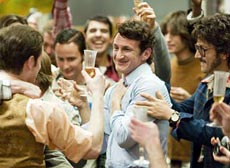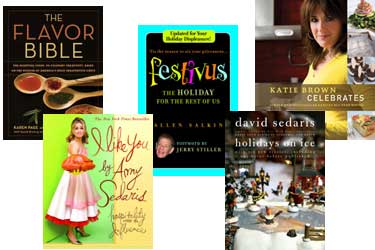 In “Milk,” Gus Van Sant’s new political bio-pic starring Sean Penn, there are frames within frames, some of them intended by the filmmaker, some the accidents of history.
In “Milk,” Gus Van Sant’s new political bio-pic starring Sean Penn, there are frames within frames, some of them intended by the filmmaker, some the accidents of history.
There is Harvey Milk, played by Penn, talking into a tape deck at his kitchen table, narrating the story we’re watching. Wrapped around that story are the real-world events that created Harvey Milk’s place in history as a gay activist and martyr: archival footage of men being arrested in gay bars and loaded into paddy wagons, colorful news video of Milk’s nemesis, the evangelical Christian and anti-gay campaigner Anita Bryant, as well as vintage street scenes from the Castro, San Francisco’s first gay enclave and Milk’s adopted home.
There is, finally, the election of 2008, with its elevation of an African-American president on the same day that Californians ratified Proposition 8, banning gay marriage in their state. “Milk” comes at a perfect time to remind us that we’re all more free when some of us become more free.
The film isn’t always up to the task. Among all these frames is a pretty standard film biography, with characters spouting unlikely summaries of the action so far or telegraphing their fates–“What’s all this activism in politics?” asks Harvey Milk’s boyfriend Scott from bed one morning, letting us know early on that Milk will have to sacrifice everything, even Scott, for the cause.
At times I found myself wishing Van Sant would give up and simply let us luxuriate in the contemporary shots of bell-bottomed marchers and Bryant crooning about Jesus. But that would deprive us, and “Milk,” of two outstanding performances from Penn and his co-star, the increasingly impressive Josh Brolin.
“Milk” begins to trace its hero’s life in the mid-1970s. By then roundups of gay men had become rare and in Greenwich Village in New York and the Castro, homosexuals could congregate openly and offer each other mutual protection. But when Harvey Milk (Penn) arrives in the Castro with Scott (James Franco), he sees there is much more to be done before he and his fellow gay men can call themselves free.
Penn portrays Milk at once convincingly and as if experimenting with a new set of parameters for building a character. Penn stretches as Milk stretches, giving the nuts and bolts of Milk’s political rise the pulse of personal discovery. Milk watches amazed as his political clout grows as he becomes more openly and truthfully who he is inside.
Brolin, as Milk’s assassin, Dan White, is the brooding, macho presence that we saw in “No Country for Old Men” but here his character is led to commit violence by his own uncertainty. White, a stalwart city fireman and cop, resents Milk’s natural skills as a legislator. Milk suspects that White is gay himself, and can’t deal with his feelings. But Brolin’s performance is more subtle, communicating White’s inability to process how Milk–someone who he’s been raised to think of as less than a man–outshines him in the art of political horse trading.
Subtlety does not otherwise abound in “Milk.” Screenwriter Dustin Lance Black documents too much and too rarely allows his historical figures to breathe. While Brolin and Penn are granted the screen time to establish their characters, secondary players are left to struggle to make their overdetermined lines sound natural–Emile Hirsch in particular adds a much needed pinch of salt to the movie as Cleve Jones, one of Milk’s closest lieutenants. For Black, this movie was a mission to change hearts and minds, and it shows.
There are some terrible ironies in Milk’s story. One is that Milk’s victory over Bryant’s anti-homosexual campaign–his one achievement celebrated in the movie–was a Pyrrhic one, in that it helped rouse the religious right that would bedevil gay politics for years to come. The movie ends with the massive candlelight march through San Francisco to protest Milk’s murder. In lionizing Milk this way, the movie doesn’t give us any clue why the same Californians we see defeating Bryant’s agenda would vote, again with conservative religious backing, to undo gay marriages already on the books 30 years later.
As a result “Milk” feels like a big pat on the back for its natural audience, which probably won’t include many hardcore evangelical Christians. Thanks to people like Harvey Milk, it tells the enlightened, we’ve won. If he could see us now, Harvey Milk probably wouldn’t agree.



